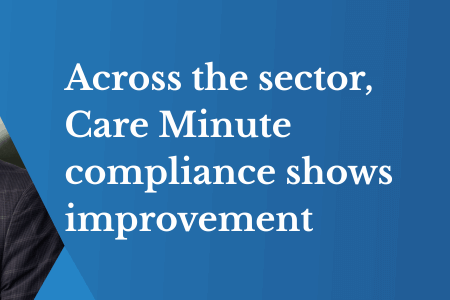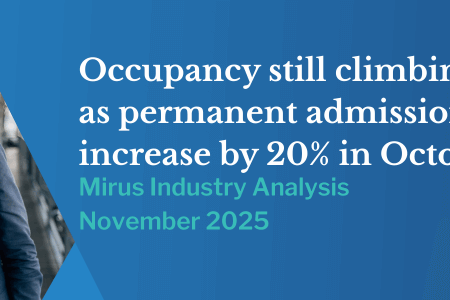Resident experience is rising but food and accommodation costs remain a challenge
October 29, 2025 | Aged Care Reform

By Tyler Fisher, Data Scientist
The introduction of the New Aged Care Act and Strengthened Standards marks a pivotal moment for aged care in Australia. With promises of person-centred, rights-based care that prioritises dignity, safety, and consistency, the sector is poised for transformation. But how much change will this legislation truly deliver?
Our recent poll reveals cautious optimism: 70% of respondents believe the Act will bring some improvements, though gaps will remain, while 18% expect significant progress. Only a small minority (12%) are sceptical or unsure. This overwhelming sentiment suggests that while the sector welcomes reform, there’s recognition that legislation alone cannot address all challenges.
One of the most pressing questions is: what are the gaps that legislation cannot close? While the Act sets a higher bar for care delivery, it also introduces cost burdens that are increasingly passed on to consumers. Since the start of the year, nearly three-quarters of aged care services have increased their room prices, some multiple times. This trend coincides with the rise in the maximum RAD (Refundable Accommodation Deposit) price without prior approval, prompting concerns about affordability and equity.
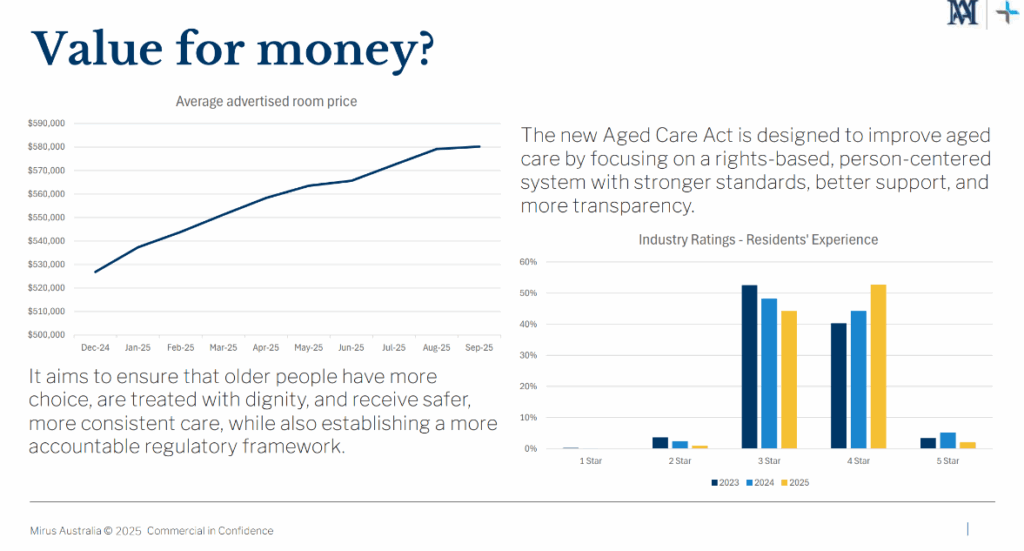
The critical issue becomes whether these higher costs are translating into better experiences for residents. Encouragingly, resident experience surveys over the past three years show notable improvements, particularly in areas that reflect autonomy and comfort:
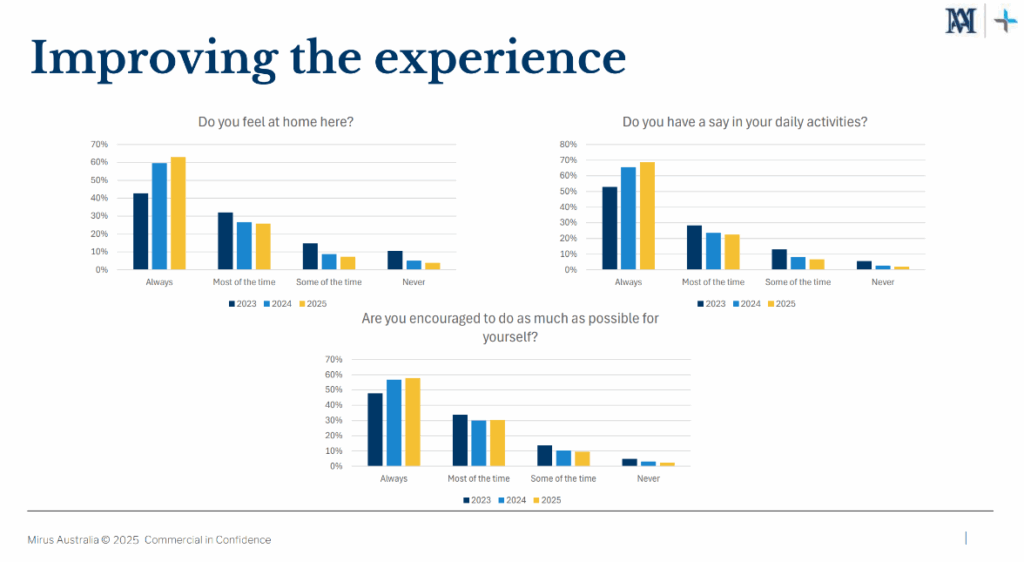
- “Do you feel at home here?” saw a jump from 40% to 60% of respondents answering “always.”
- “Do you have a say in your daily activities?” increased from 50% to nearly 70%.
- “Are you encouraged to do as much as possible for yourself?” rose from under 50% to just under 60%.
These gains suggest that aged care providers are making strides in fostering environments that empower residents and promote independence—core goals of the new legislation.
However, not all areas have seen progress. Questions like “Are staff kind and caring?” and “Do staff treat you with respect?” have remained relatively stable, with “always” responses hovering around 65–70%. While these figures are high, they may reflect the limitations of survey design rather than sector performance. Respondents may interpret “always” more strictly than “most of the time,” creating a ceiling effect that masks incremental improvements.
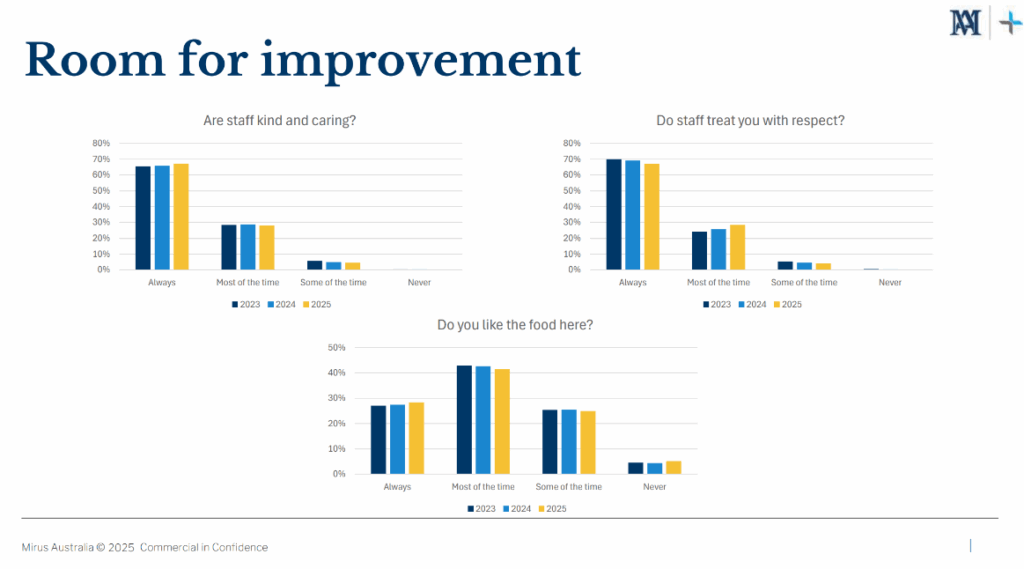
One persistent area of concern is food quality. The question “Do you like the food here?” consistently receives the lowest satisfaction scores. Despite increased attention and investment in nutrition, this remains a stubborn gap. It raises broader questions about the effectiveness of legislative reform in driving tangible change in areas that are deeply personal and subjective.
This leads to a critical reflection: what is the role of legislation versus other mechanisms in improving aged care? While the Act sets the framework, real progress may depend on industry-led initiatives, peak body guidance, and organisational culture. There’s a need for complementary strategies that go beyond compliance—fostering innovation, accountability, and continuous improvement.
Looking ahead, accommodation pricing is emerging as a key focus area. With consultations underway, stakeholders are examining everything from accommodation supplements to concessional ratios and the balance between RADs and DAPs (Daily Accommodation Payments). A comprehensive review is expected, which could reshape the financial landscape of aged care and influence accessibility for future residents.
In summary, the New Aged Care Act is a step in the right direction, but it’s not a silver bullet. The sector must continue to evolve through collaboration, transparency, and a commitment to resident wellbeing. As reforms unfold, the challenge will be to ensure that higher standards and costs lead to meaningful, measurable improvements in the lives of older Australians.
The analysis was led by Tyler Fisher, Data Scientist at Mirus Australia, and draws on aggregated industry data from the My Aged Care website.
Get a free accommodation pricing report for a limited time.
Setting the right price means understanding how your room price compares to similar options in your area, which is key to attracting potential residents. The Accommodation Pricing Report includes:
- A list of nearby facilities and competitors.
- Room types and prices for those facilities.
- Minimum, maximum, and average prices by room type.

